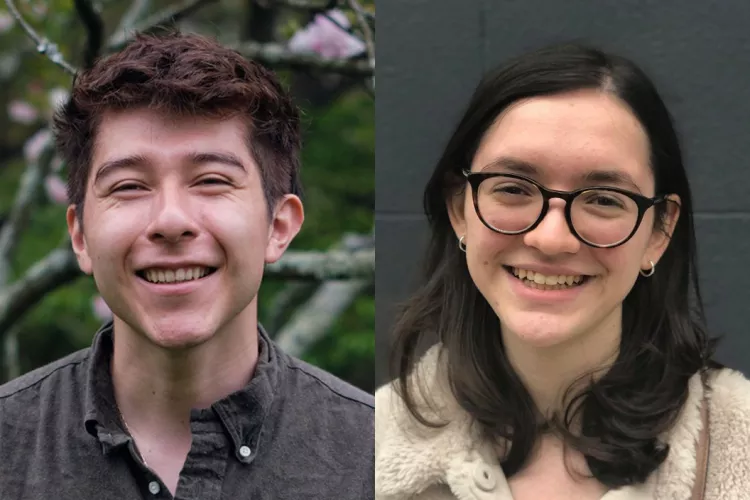Jorge Lopez-Nava '23 and Zoe Markman '24 Honored at National Diversity in STEM Conference

Jorge Lopez-Nava ’23 and Zoe Markman ’24
Jorge Lopez-Nava ’23 and Zoe Markman ’24 were honored with awards for mathematics presentations at the Society for Advancement of Chicanos/Hispanics & Native Americans in Science (SACNAS) National Diversity in STEM Conference held in Puerto Rico in October.
This honor is given to Chicano/Hispanic and Native American students who do excellent work in STEM fields.
“Being recognized for my research was amazing,” says Markman, an honors mathematics major from New York, N.Y. “It affirms that I belong in the mathematical space, and that I can pursue mathematics while staying true to my values, and keeping a commitment to accessibility and inclusion.”
Adds Lopez-Nava, a mathematics major from Salisbury, N.C.: “Being recognized for my work on this project was very meaningful for me. As a first-generation, low-income student, I never imagined myself winning an award for my STEM research. Since the field does not have many scientists with my background, I felt proud to be paving the way for any students after me.”
SACNAS’s National Diversity in Stem Conference is the largest multi-disciplinary and diverse STEM conference in the country. Every year it awards Hispanic and Native American students monetary awards for outstanding research.
Markman’s work was in theoretical mathematics in the field of combinatorics, yielding the Mathematics, Algebra/Number, Theory/Combinatorics Award.
“We studied flattened parking functions, which is a mathematical object we created by building on existing research about parking functions, and more recent work on flattened partitions,” says Markman.
Lopez-Nava conducted research in partnership with MIT computer scientist. Manolis Kellis and Ph.D. candidate Alexander Lenail as part of the Broad Summer Research Program at the Broad Institute. The project was titled “Estimating chromatin accessibility and epigenetic erosion from single-cell ATAC-seq,” and culminated in an award in the category of mathematical biology.
“We aimed to analyze neuron samples from post-mortem patients to investigate the effects of epigenetic erosion, a phenomenon that the lab has been researching,” explains Lopez-Nava. “The phenomenon occurs in aging cells and causes degradation of the epigenetic integrity of cells — this causes previously inaccessible regions to become accessible and vice versa. The goal of this project was to investigate how epigenetic erosion, responsible for changes for chromatin accessibility, can be modeled using epigenetic data from scATAC-seq data.”
Key to SACNAS’ mission is empowering and energizing individuals in their pursuit of STEM paths. The conference includes an annual celebration of multicultural traditions as part of their diversity mission.
Professor and Chair of Mathematics Aimee Johnson lauded the Swarthmore students’ efforts and achievements at the conference.
“We encourage our students to attend conferences, not only as a way to showcase their own research, but also to hear talks by various leaders in their fields, meet students and faculty from all over the world, do some networking, and just generally have fun,” she says. “SACNAS in particular, with its goal of fostering success in STEM for Chicanos/Hispanics and Native Americans, is a great place for students to make contacts and get support for their future careers.”



